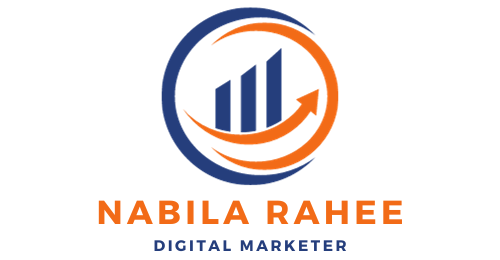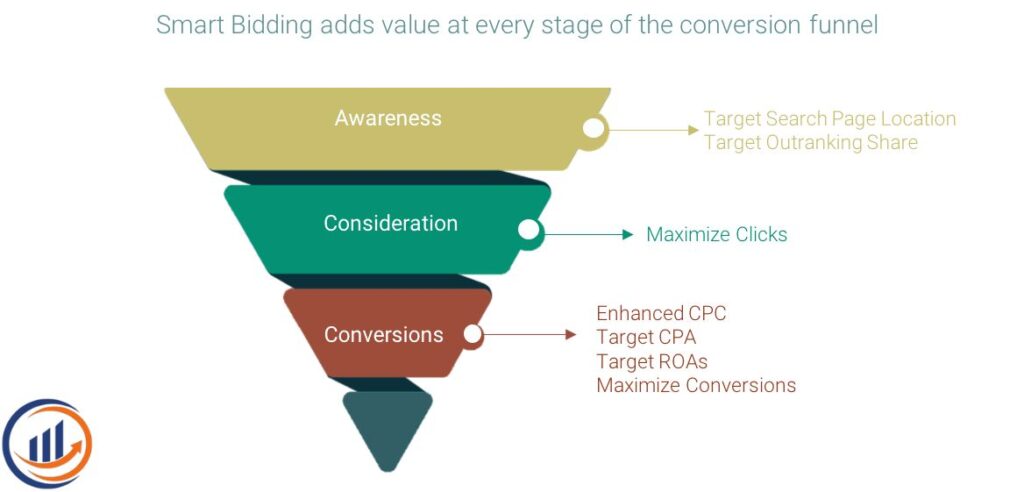In today’s competitive digital landscape, businesses need efficient ways to maximize ad budgets and drive conversions. Google Ads Smart Bidding provides an advanced, AI-driven solution, enabling marketers to optimize bids in real-time and reach their campaign goals more effectively. Implementing the right Smart Bidding strategies can significantly impact revenue, customer acquisition, and overall ad performance. Here’s a look at seven essential Google Ads Smart Bidding strategies designed to transform your ad campaigns.
1. Align Bidding Strategy with Revenue Goals
The success of your advertising campaigns largely depends on selecting the right bidding strategy that aligns with your revenue objectives. Google Ads offers several Smart Bidding strategies, each tailored to unique campaign goals. Let’s explore some of these strategies in detail:
Maximize Conversions:
This strategy is ideal for campaigns aiming to drive actions like form submissions, sign-ups, or product purchases. It automatically adjusts bids to generate the highest number of conversions possible within your specified budget.
Target CPA (Cost Per Acquisition): If your goal is to acquire new customers at a specific cost, Target CPA is an excellent choice. By setting a target CPA, Google Ads adjusts bids to meet your desired cost-per-acquisition, ensuring that you’re acquiring customers within budget while focusing on high-conversion opportunities.
Target ROAS (Return on Ad Spend):
For campaigns focused on maximizing revenue, Target ROAS allows you to set a specific return on ad spend. Google’s AI then adjusts bids based on expected conversion values, ensuring that your ads meet the desired revenue goals.
Enhanced Conversions:
Enhanced Conversions uses machine learning to optimize for valuable conversions, adjusting bids in real-time based on the likelihood of users completing high-value actions. This approach often leads to an increase in conversion rates, helping you achieve a higher return on investment.
To ensure these strategies align with revenue targets, monitor performance metrics consistently. Small adjustments, based on real-time data, can significantly impact the overall effectiveness and profitability of your ad campaigns.
2. Expand Reach with Advanced AI Tools
Google’s AI-driven tools, such as Broad Match and Performance Max, offer powerful options for expanding audience reach. These tools work in tandem with Smart Bidding to maximize your ad’s visibility and ensure that your campaign reaches the right audience segments. Here’s a closer look at how these tools function:
Broad Match:
Broad Match broadens your ad’s reach by covering related keywords and synonyms, expanding your audience coverage. For instance, using Broad Match with Target CPA can help you capture a larger audience segment, as it targets users who may use various search terms to find your product or service. This approach has been shown to increase conversions significantly, allowing for higher visibility without compromising cost efficiency.
Performance Max:
Performance Max optimizes your campaigns across all of Google’s networks—YouTube, Google Maps, Search, Display, and more—by dynamically adjusting bids for maximum results. Performance Max leverages AI to deliver your ads across multiple platforms, optimizing for the best possible results. Marketers who use this tool often experience increased conversions at similar costs per action, allowing for efficient ad spending without sacrificing results.
When combined, Broad Match and Performance Max give your ads a comprehensive reach, ensuring high visibility while maintaining efficient ad spend.
3. Integrate Revenue Execution Platforms for Enhanced Data Accuracy
For Smart Bidding to perform at its best, it requires access to comprehensive data. Many businesses, particularly those in industries like healthcare, automotive, and home services, rely on phone call conversions to drive a significant portion of their revenue. However, failure to track these call conversions can limit the effectiveness of your Smart Bidding strategy.
Revenue execution platforms, such as Invoca, capture phone call conversions and feed this data into Google Ads. By tracking these call conversions, you’re able to optimize bids more effectively, providing Google Ads with a complete picture of your conversion performance. Here’s why it’s beneficial:
Call Conversion Tracking:
Revenue execution platforms can track phone calls, allowing for precise measurement of how ads impact phone conversions. For businesses in high-stakes industries, this is crucial, as a large percentage of leads come from phone inquiries.
Comprehensive Data Integration:
Feeding this call data into Google Ads provides a more holistic view of your conversion performance. This ensures that the Smart Bidding AI has accurate information for bid optimization, focusing ad spend on the most profitable channels.
By integrating a revenue execution platform, you can ensure that Smart Bidding strategies accurately reflect your complete conversion data, driving more effective ad performance.
4. Utilize First-Party Data to Enhance Retargeting Efforts
Retargeting campaigns are a highly effective way to engage potential customers who have previously shown interest in your brand. First-party data, such as data gathered from customer interactions on your site or over the phone, can be used to create more targeted and personalized retargeting campaigns. Here’s how first-party data can be used in retargeting:
Custom Audiences:
Using first-party data, you can create Custom Audiences based on specific interactions, like product views or cart abandonment. These audiences allow for precise retargeting, helping you reconnect with users who previously showed interest.
Behavioral Retargeting:
Segment users based on their behavior, targeting them with ads that match their interests and needs. For example, you can create ads promoting specific products or services that users previously viewed, increasing the chances of conversion.
When first-party data is leveraged effectively, it allows you to create highly relevant retargeting campaigns that drive conversions and minimize ad spend waste.
5. Optimize Ad Performance with Conversion-Based Bidding
Conversion-based bidding strategies, such as Target ROAS and Maximize Conversions, optimize bids by targeting users most likely to convert. By leveraging data from previous conversions, Google’s AI can set bids that maximize performance and minimize wasted ad spend. Here’s how conversion-based bidding can improve your ad campaigns:
High-Intent Targeting:
Google’s algorithm identifies users with a high probability of converting based on past behavior, focusing bids on these individuals.
Dynamic Bid Adjustments:
Google Ads adjusts bids automatically to reach users at optimal moments, ensuring that high-value users see your ads when they’re most likely to take action.
Conversion-based bidding is an efficient way to focus ad spend on high-value users, improving conversion rates and driving revenue growth.
6. Improve Lead Generation with Google Ads Smart Bidding
For businesses focusing on lead generation, Google Ads Smart Bidding can enhance the quality of leads by optimizing bids for actions like form submissions, newsletter sign-ups, or contact requests. Here’s how lead generation campaigns can benefit from Smart Bidding:
Lead Event Tracking:
Track specific lead generation events, such as form fills or contact inquiries, to capture high-intent users and nurture them into qualified leads.
Optimized Lead Ads:
Google’s AI prioritizes ads for users who are more likely to convert, delivering optimized ads that attract potential leads efficiently.
With Smart Bidding, lead generation campaigns can achieve higher-quality leads while managing costs effectively, allowing for more impactful marketing efforts.
7. Address Call Experience Issues to Maximize Conversions
For businesses relying on phone inquiries, optimizing the call experience is crucial. Issues such as long hold times, unanswered calls, or ineffective scripts can lead to missed conversions. Revenue execution platforms offer insights into call handling performance, allowing you to identify and resolve call experience issues.
Detailed Call Reporting:
Platforms like Invoca provide detailed reports on call handling metrics, including the number of answered vs. missed calls, call conversion rates, and call durations.
Agent Performance Tracking:
Review call recordings to assess agent performance, ensuring they’re following scripts and handling leads effectively.
By addressing call experience issues, you can improve customer satisfaction, increase conversions, and make the most of your ad campaigns.
Key Takeaways for Implementing Google Ads Smart Bidding Strategies
Goal Alignment: Select a Smart Bidding strategy that aligns with your revenue goals, such as Maximize Conversions, Target CPA, or Enhanced Conversions.
AI-Powered Reach Expansion: Use tools like Broad Match and Performance Max to expand reach and enhance visibility.
Data Integration: Incorporate phone call tracking data through revenue execution platforms for accurate bid optimization.
Enhanced Retargeting: Use first-party data to create highly effective retargeting campaigns tailored to specific audience segments.
Conversion-Based Bidding: Focus ad spend on high-intent users to improve conversion rates and ROI.
Optimized Lead Generation: Capture high-quality leads using event tracking and targeted lead ads.
Improved Call Experience: Resolve call handling issues to maximize conversions from phone leads.

